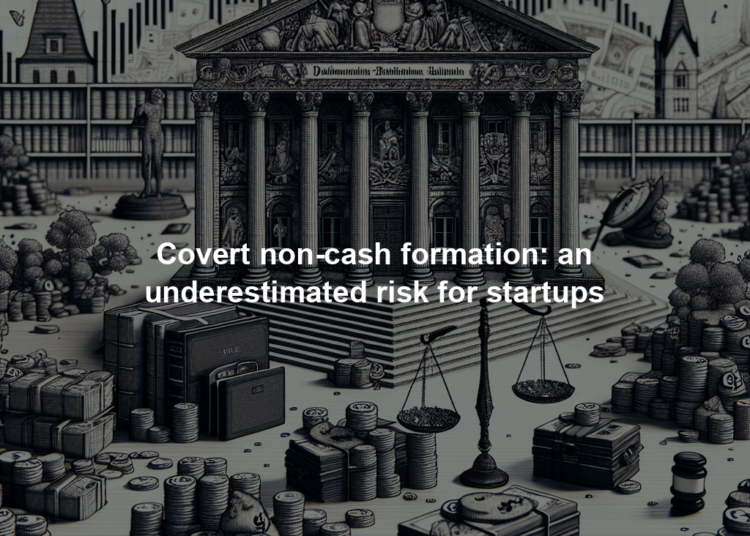As a lawyer, I repeatedly encounter cases in which startups unexpectedly stumble due to legal pitfalls. One such stumbling block that deserves special attention is “hidden non-cash incorporation.” This problem occurs particularly in the start-up phase, when the entrepreneurial focus is primarily on product development and market entry.
What is a hidden non-cash foundation?
Concealed non-cash formation manifests itself when assets such as software or goods are contributed to a GmbH disguised as cash contributions. From a legal point of view, these are contributions in kind, but they are not declared accordingly. A common case is that founders who previously worked together in a GbR, without a strong sense of guilt, sell assets to the newly formed GmbH. However, this action, often committed out of ignorance or underestimation of the legal implications, can have far-reaching consequences. This is because the legal framework conditions that distinguish a GmbH from a GbR are not merely formal in nature. They also imply stricter capital raising and maintenance. In this context, hidden non-cash contributions may lead to liability of the shareholders, especially if the assets contributed do not have the declared value. Therefore, it is of utmost importance that founders are aware of the importance of a correct declaration of contributions in kind and respect the legal intricacies of setting up a company.
Why is this problematic for startups?
For startups that begin as a GbR and later become a GmbH (limited liability company), a hidden non-cash formation entails considerable legal risks. A discrepancy arises between what legally appears to be a cash contribution and what is economically to be regarded as a contribution in kind. The qualification of these transactions as a hidden contribution in kind leads to the fact that, pursuant to Sec. 19 (4) Sentence 1 GmbHG, the cash contribution obligation is deemed not to have been fulfilled and can be claimed again by the GmbH. However, under certain conditions, the value of the asset can be offset against the GmbH’s contribution claim, thus ruling out a double claim on the cash contribution obligation
1
.
Under insolvency law, a hidden non-cash formation may lead to over-indebtedness, which may not be recognized or declared in a timely manner, which may result in liability of the managing directors (§ 15a InsO).
In terms of criminal law, the concealed formation in kind may result in personal civil liability of the managing director vis-à-vis the GmbH pursuant to Section 9a GmbHG and criminal liability of the managing director pursuant to Section 82 (1) No. 1 GmbHG, with the range of punishment extending from a fine to a prison sentence of up to three years.
The legal consequences of a concealed non-cash formation can be serious. According to § 19 IV GmbHG, the obligation to make a contribution remains in money. Agreements on the hidden contribution in kind and the corresponding legal acts are not invalid. The value of the assets is credited against the shareholder’s monetary contribution obligation, but only after the company has been registered in the Commercial Register. It should be noted, however, that contracts governing any subsequent transfer are not trivial. While the GmbH and the shareholders may have problems later, the GbR could have tax problems if these tangible assets are sold too favorably to the GmbH. Such transactions must be carefully reviewed to ensure that they comply with tax law requirements and do not create unexpected tax burdens.
Prevention and recommendations for action
Knowledge of hidden non-cash formation and the correct application of § 19 IV GmbHG are essential in order to avoid legal pitfalls. Expert legal advice is recommended to identify and minimize risks. All transfers of assets should be transparent and in compliance with the law, especially when registering in the Commercial Register.
Conclusion
The founding and development of a startup entails opportunities as well as legal challenges. Legal prudence and diligence are just as important as an innovative business idea. Only with a solid legal foundation can unexpected challenges be avoided and long-term success ensured.












































